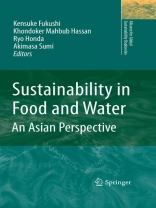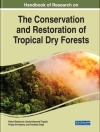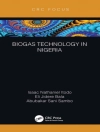Foodandwatersecurityissuesareregardedassinequanonif asocietywants to p- mote health, peace and prosperity. People who are well fed are also people with the means to changetheir situation. However, this is still an immense challengefor Asia especiallyintheglobalenvironmentalperspectiveinthe21stcentury. Peoplearound the globe will be facing a combination of problems concerning both environmental as well as social changes; therefore, the policy for future food and water security has to be upgraded in an integrated and holistic way. The need to put into persp- tive the ever-mounting body of new information on environmental security of food and water issues in Asia beyond the boundaries of separate disciplines provided the impetus for the development of this book. It is a compilation of selected ar- cles from two international symposiums entitled “Food and Water Sustainability in China 2007” and “Food and Water Sustainability in Asia 2008” which were held in Macau, China. Eminent scientists/researchers from different parts of Asia spoke at the symposium on topics such as the challenges in sustainable water resource m- agement, future projection of development strategies for sheries, increased yield of food grains by rainwater management in arid lands, multi-functional role of rice paddy area for food and water sustainability, the impact of biofuel production on food security, reclaimed wastewater for sustainable urban water use, heavy metal removal from contaminated soil and water, and adaptation strategies to cope with the climate change issues for food and water.
Tabela de Conteúdo
Water Resources Management.- Sustainable Water Resource Management in China: A Great Challenge.- Affecting Factors of Salinity Intrusion in Pearl River Estuary and Sustainable Utilization of Water Resources in Pearl River Delta.- Water Resource Management in Asian Cities – Case Studies of Groundwater Management.- Identification of Main Factors and Their Relationships in Urban Runoff Pollution of Macau Based on Statistical Techniques.- Assessment of Spatial Variations in Surface Water Quality of Kyeongan Stream, South Korea Using Multi-Variate Statistical Techniques.- Real-Time Water Resources Analysis and Assessment for Supporting Beijing Water Sustainability.- A GIS-Based Bio-Economic Model Applied in Water Resource Management in Shiyang River Basin, Gansu Province, China.- On the Change of Virtual Water in China under Regional Restructuring from 1997 to 2000.- Sustainability in Local Water Use.- Potential Reuse of Wastewater Effluent in Macau.- Ozone Used as a Technology for Reducing the Risk of Wastewater Reuse.- Sustainable Water Management of Reclaimed Water Use: Case Study of Tianjin.- Organic Hindrance in Groundwater Arsenic Removal Practice.- Factors Associated with Faecal Contamination of Household Drinking Water in a Rural Area, Vietnam.- Alternative Safe Water for Communities in the Mekong Delta and Coastal Zone: Vietnam.- Community Based Management of Traditional Water Resources in Western Himalayan Region.- Aquatic Food Production.- Quality and Safety of Aquatic Products in China.- Notes of Study on Development Strategy of Chinese Fishery to 2030.- Changes in Fisheries and Water Environments of Lake Taihu, China.- Wastewater Management in Freshwater Pond Aquaculture in China.- Dosing and Timing Addition of Bacterial Biomass for Improving the Water Environment in Shrimp Farming.- Study of Mercury Pollution at Bantarpanjang Area (Citarum River) Using Biomarker.- Crop Production.- Increased Wheat Yield by Rainwater Management: A Case Study in Arid Lands of Iran.- Water – An Emerging Critical Factor in Chinese Rice Production and Trade.- Sustainability of Water-Use and Food Production in the Haihe Catchment.- Exploring Land Use Planning Options: Experiences and Challenges for Food and Water Security.- The Impact of the Bio-Ethanol Production to the World Grain Market: A Case Study of World Maize Market.- Optimization of Rice Supply Chain in Thailand: A Case Study of Two Rice Mills.- Exploring Behavioral Changes towards Chemical-Safe Agriculture: The Case of Thai Vegetable Farmers.- Supply-Demand Balance of Compost between Urban and Agricultural Sectors According to Peri-Urban Development in an Urban-Rural Fringe Area in Asia: A Case Study in Nonthaburi, Thailand.- Food and Water Security in Climate Changes.- Water Resources in the Hexi Corridor and Its Cycle.- Adaptive Capacity to Changes in the Water Cycle: A Case Study of Northern China.- Measuring Climate Change Risk on Supply Chain of Rice in Bangladesh.- The Multi-Functional Role of Rice Paddy Area for Food and Water Sustainability – Lessons Learned from Korean Tradition.- Promoting Plant Residue Utilization for Food Security and Climate Change Mitigation in Thailand.- No-Regret Adaptation Strategies to Cope with Potential Impacts of Climate Change on Groundwater Resources of Asian Cities.- Environmental Management.- Food or Environment: An Alternative Solution to Tradeoff of Water Allocation in Oasis Regions of China.- Impacts of Water Environment and Conservation for Sustainable Development in Northern Philippines.- Material Flow Analysis of Nitrogen and Phosphorus for Regional Nutrient Management: Case Study in Haiphong, Vietnam.- Application of Sulfur Denitrification Process to Remove Nitrate-nitrogen Discharged from Agricultural Field.- Bioremediation of Soil and Groundwater Contaminated by Volatile Organic Compounds.- Cadmium Extraction from Contaminated Soil Using an Iron Chloride Solution in Asian Countries.- A Strategy in Assessing Plant Residue Material Quality to Enhance Sustainability of Lowland Agricultural Systems.- Redesigning Institutions and Governance Systems for Urban Water Demand Management: Case of Developing City Delhi, India.- The Impact of Regulatory Change on Trading Partners: Race to the Bottom or Convergence to the Top?.
Sobre o autor
Prof. Akimasa Sumi
Professor and Executive Director of the Transdisciplinary Initiative for Global Sustainability (TIGS) at the University of Tokyo (UT). He started his career serving for the Japan Meteorological Agency and later joined UT, as a professor. His research interest is focused on numerical modeling of weather and climate, especially in the context of global climate change. Recently he led a Japanese team to build the highest-resolution climate model for use with Japan’s Earth Simulator, one of the world’s best supercomputers. The successful outcome deepened the understanding of climate change, and significantly contributed to the most recent report of the Intergovernmental Panel on Climate Change (IPCC). He was also a Lead Author of chapter 8 of AR4, Working Group I of IPCC. From 1994-2004, he served as Director of the Center for Climate System Research at UT. As the research need on global warming has changed with the changing public awareness, he expanded his research to cover global sustainability, a key concept in addressing climate change. Since 2005, he has been working as the Executive Director in TIGS and promoted researches on various aspects of global sustainability. Currently he also serves as a Member of the Central Environment Council of the Japanese Government.
Dr. Kensuke Fukushi
Dr. Kensuke FUKUSHI is an associate professor at Transdisciplinary Initiative for Global Sustainability (TIGS), Integrated Research System for Sustainability Science (IR3S), University of Tokyo. After receiving his Ph D from the Department of Civil and Environmental Engineering, University of Utah in 1996, he worked as an assistant professor at Department of Civil Engineering, Tohoku University from 1996 until 1999, as an assistant professor at School of Environment, Resources and Development, Asian Institute of Technology, Thailand from 1999 until 2001, and as an associate professor at the same school until 2001. Then he movedto an associate professor at Environmental Science Center, University of Tokyo in 2001, and arrived at the current position in 2006. He is an expert on environmental engineering, and especially familiar with pollution and remediation of heavy metals in water and soil, and risk assessment. He published his work in various international journals related to water research, environmental engineering, and microbiology.
Dr. Ryo Honda
Dr. Ryo HONDA is a project assistant professor at Transdisciplinary Initiative for Global Sustainability (TIGS), Integrated Research System for Sustainability Science (IR3S), University of Tokyo. He has got his Ph D at Department of Urban Engineering, Graduate School of Engineering, University of Tokyo in 2005. He is an expert in biological wastewater treatment and water resource management. He has good experiences in the field studies in developing world in Asia. He published his work in international journals on environmental engineering and applied microbiology.
Dr. Khondoker Mahbub Hassan
Dr. Khondoker Mahbub HASSAN is a project researcher at Transdisciplinary Initiative for Global Sustainability (TIGS), Integrated Research System for Sustainability Science (IR3S), University of Tokyo. He got his Ph D from the Department of Urban Engineering, Graduate School of Engineering, University of Tokyo in 2009. In his home country, he holds a position of Assistant Professor, Department of Civil Engineering, Khulna University of Engineering & Technology, Bangladesh. He is an expert in water treatment and water resource management. He was involved with many water related projects for field implementation in the developing countries in Asia. He published his work in various international journals related to water research, and environmental engineering.












